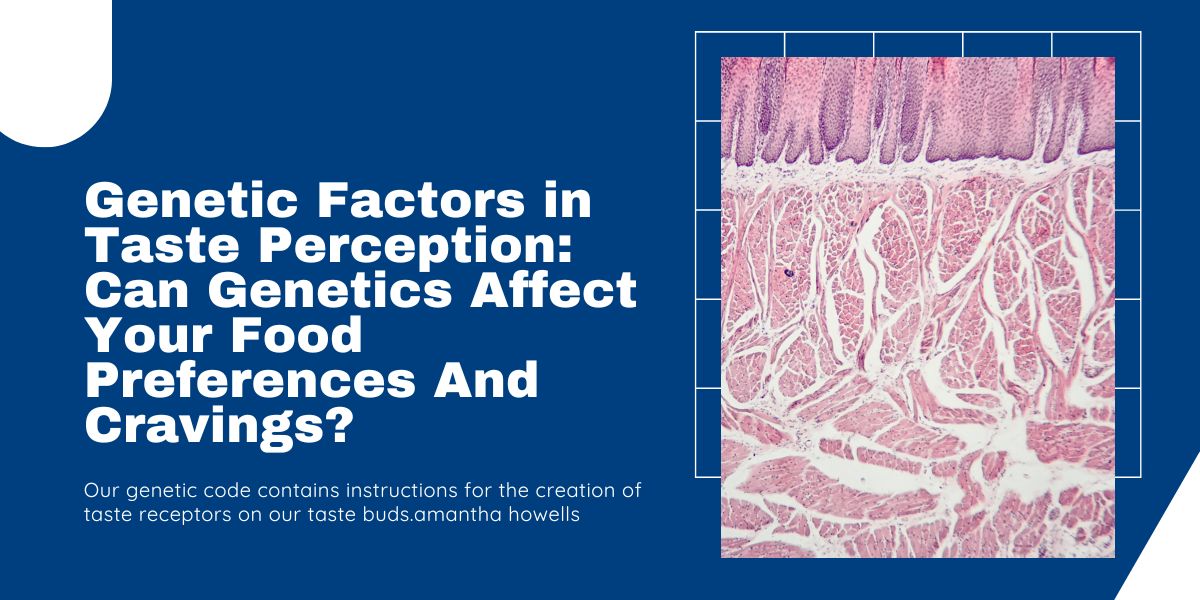Genetic Factors in Taste Perception: Can Genetics Affect Your Food Preferences And Cravings?
Unveiling the Genetic Code of Flavor: How Your Genes Influence What Tastes Good

Genetic Factors in Taste Perception
Food preferences are highly personal, shaped by a combination of cultural, environmental, and individual genetic factors. However, emerging research suggests that our genetic makeup plays a crucial role in determining how we perceive and enjoy different flavors. In this in-depth exploration, we’ll delve into the fascinating world of genetic factors in taste perception, unraveling the complex interplay between our genes and the foods we love.
Introduction: The Science Behind Your Taste Buds
Taste is a complex sensory experience, involving multiple factors such as aroma, texture, and temperature. At the core of this intricate process are taste buds, specialized sensory organs that detect the basic tastes: sweet, salty, sour, bitter, and umami. How our taste buds interpret these flavors is not a one-size-fits-all scenario—genetics significantly influences our taste perception.
Understanding Genetic Factors: The Basics
Our genetic code contains instructions for the creation of taste receptors on our taste buds. These receptors are responsible for detecting specific taste molecules, and variations in our genes can lead to differences in how we perceive flavors. We’ll explore the genetic basis of taste receptors and how variations can impact our individual taste preferences.
The Genetics of Sweetness: Exploring Sugar Sensitivity
Sweet Tooth or Not: The Role of TAS1R Genes
Why do some individuals have an undeniable sweet tooth, while others are less drawn to sugary treats? The answer may lie in the TAS1R gene family, which encodes receptors for sweetness. We’ll examine how genetic variations in TAS1R genes can influence sugar sensitivity and impact an individual’s inclination towards sweet flavors.
Bitterness Perception: The Impact of TAS2R Genes
Bitter Enemies or Bold Adventurers? TAS2R Genes and Bitter Tastes
The perception of bitterness is highly variable among individuals, and TAS2R genes are at the center of this diversity. Some people are more sensitive to bitter tastes, while others may hardly notice them. We’ll explore how genetic variations in TAS2R genes contribute to differences in bitterness perception and the implications for food choices.
Sensitivity to Salt: The SCNN1 Gene Connection
Salt Lovers or Moderators: SCNN1 Genes and Salt Perception
Salt is a crucial flavor enhancer, but individuals vary in their sensitivity to it. The SCNN1 gene is associated with salt perception, and variations in this gene can influence whether someone prefers saltier or less salty foods. We’ll delve into the role of SCNN1 genes in shaping individual responses to salt in the diet.
Umami and Sour Tastes: Genetic Influences Unveiled
Umami Enthusiasts: The Impact of Umami Receptor Genes
Umami, often described as a savory or meaty taste, has its own set of receptor genes. We’ll explore how genetic factors contribute to individual preferences for umami-rich foods and the potential implications for dietary choices.
Sour Sensations: Genetic Variability in Acid Perception
Sourness adds a refreshing element to many foods, but individuals differ in their sensitivity to acidic tastes. Genetic factors, including the PKD2L1 gene, play a role in acid perception. We’ll discuss how these genetic variations can influence preferences for sour flavors.
Beyond the Basic Tastes: Genetics and Food Aversion
Genetic Predispositions to Food Aversions: The Vomeronasal Receptor Genes
In addition to the basic tastes, genetic factors can also influence our aversions to certain foods. Vomeronasal receptor genes, traditionally associated with pheromone detection, are implicated in the perception of specific odors and tastes. We’ll explore how these genes contribute to individual food aversions and dislikes.
Practical Implications: Navigating Your Genetic Taste Profile
Personalized Nutrition: Tailoring Diets to Genetic Taste Preferences
Understanding your genetic taste profile can have practical implications for personalizing your diet. We’ll discuss how individuals can leverage genetic insights to make informed choices about food, enhance their eating experiences, and potentially adopt healthier eating habits.
Conclusion: Embracing the Diversity of Taste
In conclusion, the influence of genetics on taste perception adds a layer of complexity to our individual relationships with food. Embracing this diversity can lead to a greater appreciation for the richness of flavors and a more nuanced understanding of why we crave certain foods. As science continues to unveil the secrets of our genetic taste preferences, the culinary world may see exciting advancements in personalized nutrition.




